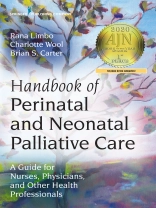The first resource of its kind, this authoritative handbook holistically addresses the multidimensional aspects of perinatal and neonatal palliative care. Written by an interprofessional team of renowned specialists, it is both a text and an evidencebased reference for all members of the palliative care team. This book helps individual team members forge interdisciplinary approaches to care, assess current programs, improve the quality of care, and tailor new models of care.
Encompassing the perspectives of numerous multidisciplinary healthcare providers, the book underscores the unique aspects of perinatal and neonatal palliative care, with a focus on improving quality of life, as well as comfort at the end of life. It describes healthcare for neonates and pregnant mothers, care and support of the family, planning and decision-making, and effective support for grief and bereavement, addressing all palliative and neonatal care settings.
Other chapters focus on the prenatal period after diagnosis of the expected baby’s life-threatening condition. These include such topics as care of the mother, delivering devastating news, and advance care planning. Each chapter contains photos, figures, and/or tables and case studies with clinical implications and critical thinking questions. Also included is an extensive listing of relevant palliative care organizations. Paintings and poetry provide an artistic backdrop to the authors’ inspiring words.
- Addresses a growing need for specific provider resources in neonatal palliative care
- Covers the clinical and emotional aspects of palliative care for babies and their families
- Abundant resources for effective and compassionate family-centered care
- Case studies with critical thinking questions
- Accompanying video clips of healthcare and family interactions
- Supplemental image bank included
Key Features:
Tabella dei contenuti
Contributors
Foreword
Preface
Acknowledgments
About the Art and Artists
SECTION 1: UNDERSTANDING PALLIATIVE CARE
1. Advancing Palliative Care to Perinatal and Neonatal Settings
2. Neonatal and Perinatal Palliative Care Services and Programs
3. Creating Seamlessness in Palliative Care Services
SECTION 2: CARING FOR THE WHOLE FAMILY IN PALLIATIVE CARE
4. Comfort in Perinatal and Neonatal Palliative Care: An Innovative Plan of Care Focused on Relational Elements
5. Suspending Judgment: Being With and Knowing the Family
6. Helping Siblings Connect, Relate, and Say Goodbye
7. Barriers to Referring Patients for Perinatal Palliative Care
SECTION 3: PLANNING AND DECISION-MAKING
8. Communicating Devastating News
9. Grief and Memories Begin With Diagnosis
10. Anticipatory Guidance: Birth and Advance Care Planning
11. Difficulty in Predicting Survival: Genetics and Genetic Counseling
12. “Compatible With Love”: Qualitative Analysis of Decision-Making Rationale of Parents Who Continue a Pregnancy Affected by a Life-Limiting Fetal Condition
13. Perinatal Regoaling in the Face of Serious Illness: Hopeful Thinking, Good-Parent Beliefs, and Uncertainty
14. Building and Sustaining Relationships During Pregnancy
SECTION 4: PHYSICAL ASPECTS OF PALLIATIVE CARE: DIAGNOSIS, TREATMENT, AND OUTCOMES
15. Attending to Pain and Suffering in Palliative Care
16. Managing Pain and Discomfort in the Mother
17. Perinatal Palliative Care in the Context of Fetal or Neonatal Surgery
18. Palliative Care at the Time of Unexpected Premature Delivery
19. Compassionate Extubation and Withdrawal of Life-Sustaining Therapies
SECTION 5: SUPPORTING FAMILIES AND CARE PROVIDERS THROUGH THE NUANCES OF PALLIATIVE CARE
20. Lactation and Breastfeeding in the Context of Perinatal Palliative Care
21. Ten Ethical Principles for Neonatal Palliative Care
22. Spirituality: The Effects of Another’s Pain and Suffering on Care Providers
23. Assessing Perinatal Grief Intensity in the Palliative Care Setting
24. Strategies to Honor Professional Well-Being in Perinatal and Neonatal Care
Appendix: National Palliative Care Organizations and Resources
Index
Circa l’autore
Brian S. Carter, MD, FAAP, earned his bachelor of science in biology at David Lipscomb College and his medical doctorate from the University of Tennessee, College of Medicine—both with honors. He completed his residency in pediatrics at Fitzsimons Army Medical Center and his fellowship in neonatal–perinatal medicine at the University of Colorado—he is Board Certified in both. His scholarly interests have long included medical ethics and palliative care. Dr. Carter joined other early pediatric palliative care advocates and helped lead the way toward the integration of palliative care within the NICU and in the prenatal diagnostic clinics. His work has included decision-making in the NICU, incorporating parents into the care of their newborn, post-NICU follow-up, and the interdisciplinary team’s role in neonatal–perinatal palliative care. He continues to practice neonatology, see patients in follow-up, teach, write, and speak. He has published numerous peer-reviewed journal articles, book chapters, and co-edited or co-authored three books. He is a Fellow of the American Academy of Pediatrics and received honors from the AAP and the National Hospice and Palliative Care Organization.












